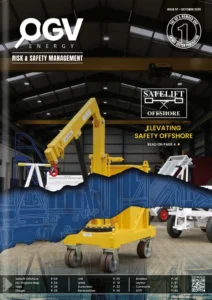Test programme success for collaborative renewable subsea power project, extension secured.
Renewables for Subsea Power (RSP) project completes initial four-month test programme, using wave power in conjunction with subsea batteries to power AUVs, subsea control systems and enabling communications.
Project extension secured for further testing in the UK North Sea.
Project collaboration by Mocean Energy and Verlume, alongside Baker Hughes, Serica Energy, Harbour Energy, PTTEP, Transmark Subsea, and Net Zero Technology Centre (NZTC).
A collaborative renewable subsea power project has successfully completed its initial four-month test programme in the UK North Sea, proving that a subsea battery storage system can reliably power subsea equipment through being recharged by a wave energy device.
Deployed in the waters five kilometres off the East coast of Orkney, Scotland in February 2023, the Blue X wave energy converter – built by Edinburgh company Mocean Energy – was connected with a Halo underwater battery developed by Aberdeen intelligent energy management specialists Verlume in a ‘first-of-its-kind’ project.
The four-month RSP test programme was devised to prove the concept of using renewables to power subsea equipment, employing intelligent subsea battery storage to manage the inherent intermittency and deliver a continuous power output through the batteries.
A key objective of the project was to demonstrate that the system could provide power to subsea electronics modules, provided by Baker Hughes, simulating the control and communications needed for subsea well heads using 100% renewable energy.
In addition, tests were conducted using a resident autonomous underwater vehicle (AUV) provided by Transmark Subsea. This included having a docking station integrated onto the Halo system to create a charging point and a communications link to the surface via the Halo through the Blue X. The AUV was charged 50 times to show effective clean power delivery to underwater vehicles.
Following the success of these tests, showing an integrated alternative to subsea umbilical cables, the test programme has been extended. The technologies will remain in the water and will conduct additional testing deliverables until spring 2024, allowing for further industry-leading project data to be captured around maintainability, survivability and reliability.
Andy Martin, Chief Commercial Officer at Verlume said:
“The successful conclusion of the initial four-month test programme is a significant achievement. We are particularly proud, as one of the project leads, to have demonstrated how our technology can effectively integrate with Mocean’s wave energy converter to demonstrate a viable method of decarbonising future offshore operations.
“It has been fantastic to see the full system deployed, connected and fully operational over this period and we are looking forward to receiving further project data to demonstrate how this integrated system can provide a range of clean power use cases in other areas such as vessel charging, carbon capture and storage, and offshore wind.”
Alongside the two project lead companies, Mocean Energy and Verlume, industry players include Baker Hughes, Serica Energy, Harbour Energy, Transmark Subsea, and the Net Zero Technology Centre (NZTC). The most recent addition is Thai State energy major PTTEP, demonstrating the international interest in this decarbonisation project.
Cameron McNatt, managing director of Mocean Energy said:
“The test programme has given all project partners growing confidence in our system’s reliability and ability to power a range of subsea application.
“This confidence is underscored by the welcome addition of PTTEP to the consortium, with growing interest from a number of other major energy players.”
The Orkney deployment is the third phase of the Renewables for Subsea Power project. In 2021, the consortium invested £1.6 million into phase two of the programme – which saw the successful integration of the core technologies in an onshore test environment at Verlume’s operations facility in Aberdeen.
In 2021, Mocean Energy’s Blue X prototype underwent a programme of rigorous at-sea testing at the European Marine Energy Centre’s Scapa Flow test site in Orkney where they generated first power and gathered significant data on machine performance and operation.
Verlume’s seabed battery energy storage system, Halo, has been specifically designed for the harsh underwater environment, reducing operational emissions and facilitating the use of renewable energy by providing a reliable, uninterrupted power supply. Halo’s fundamental basis is its intelligent energy management system, Axonn, a fully integrated system which autonomously maximises available battery capacity in real time.
Published: 30-08-2023














